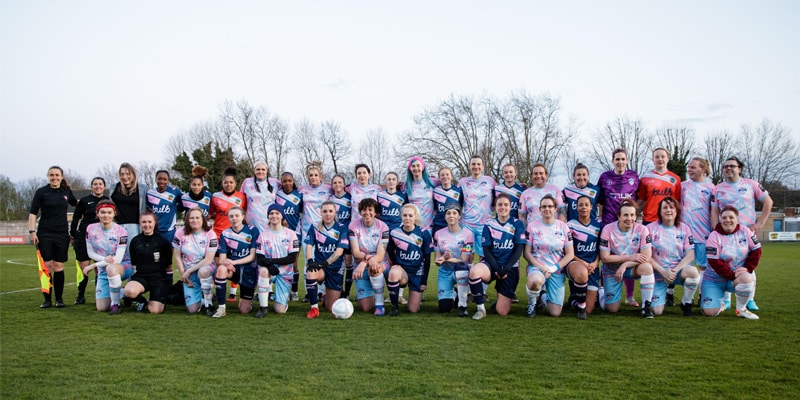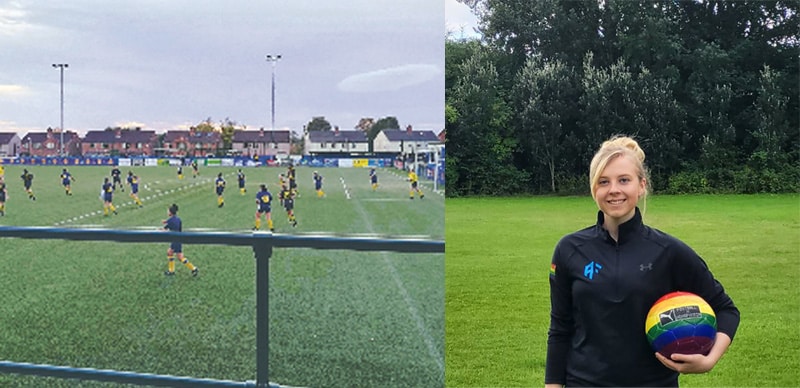
TRUK United line up with Dulwich Hamlet Women before their friendly in March. Alamy
The Alternative Football League and clubs such as Manchester Laces show demand is there but players still face huge hurdles to wider participation
By Jim Keoghan
19 December 2022
In March of this year, history was made when TRUK United Women took on Dulwich Hamlet Women in a friendly at the latter’s Champion Hill stadium. It was historic because, in a world first, TRUK fielded a team comprised solely of transgender women. The game took place on the Transgender Day of Visibility, the final day of the Football v Transphobia week of action. It’s a campaign that seeks to amplify the voices of trans people and allies in all aspects of football.
“Football is meant to be for everyone,” says Lucy Clark, founder of TRUK United. “What clubs such as ours provide is a medium for that to be the case for trans and non-binary players, some of whom might have previously felt excluded from the sport. When we launched we got around 100 people interested in playing for us. That was an incredible response. And it’s one that shows you how much demand there was for a different way of doing football.”
Clubs like TRUK represent a growing trend that has emerged in the grassroots game in recent years, whereby an inclusive space for trans and non-binary players is being created. It is a trend that has seen trans men and women playing mainstream football, new clubs established across the country, and leagues and competitions set up to provide a more progressive approach to the game.
“There shouldn’t be restrictions to accessing the sport because of how you identify,” says Beth Barnes, co-founder of the Alternative Football League (AFL), a small-sided, inclusive competition based in Manchester. “Our league was established to create a place where anyone can feel comfortable playing the game. We have players enjoying the sport for the first time, players who thought that football was something inaccessible to them. And so far, the AFL has gone from strength to strength. We have two sites, north and south Manchester, and the former is already in its fifth season.”

Manchester Laces in cup action against Mancunian Unity; Beth Barnes, co-founder of the Alternative Football League. Beth Barnes/The Alternative Football League, Manchester Laces
But despite the progress being made, access to football for those from the trans and non-binary community remains an area of contention. In October, Manchester Laces, an inclusive women’s and non-binary side, had one of their results annulled after fielding an “ineligible player”. The player in question, who identifies as non-binary, was “ineligible” because they had failed to submit hormone readings, a stipulation the FA requires in such situations before any affiliated match to prove testosterone levels are “within range to minimise any advantage”.
Although many transgender players are happy to adhere to the current regulations, as evidenced by the growing number playing affiliated football, not all are. In this instance, the player wasn’t comfortable, and also questioned whether the process was clear and fair. Helen Hardy, founder of the Manchester Laces, has said that the club could now face further punishment from the FA, and that the Association had left the player feeling “cornered and uncomfortable”.
This case is not an isolated one. In recent years, a number of individuals have been effectively excluded from FA-governed football and several clubs denied FA affiliation because of the existing regulations surrounding hormone testing. “I understand that it’s a difficult situation for the FA,” says Barnes. “However, I think they have been apprehensive of properly opening the door to trans and non-binary players because that would require a full restructuring and update of their current policy.”
When questioned about that “current policy”, an FA spokesperson stated the existing system is under review: “The landscape around this important subject is both complex and constantly evolving, and we are taking the time to ensure that we have an appropriate policy in place. Therefore, like many other national governing bodies in sport, we are currently in the process of reviewing our transgender policy for English football.”
However, the fact that there is no fixed timetable for this review process, or necessarily a guarantee it will resolve every issue, does little to help those from the trans and non-binary community for whom the existing system is currently failing. “Unfortunately, there’s still a long way to go in football, and that’s why non-affiliated leagues like ours, and others, are so important,” says Barnes. “While the FA are ironing out where they stand, transgender people still need somewhere to play. Fortunately, at grassroots level, there are people creating spaces to make this happen, people who believe that ‘Football for All’ really does apply to everyone.”
This article first appeared in WSC 427, January 2023. Subscribers get free access to the complete WSC digital archive
Want to see your writing published in WSC? Take a look at our pitching guide and get in touch
Tags: Transgender
